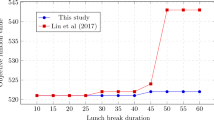Abstract
This paper studies a time minimizing assignment problem (TMAP) also known as the bottleneck assignment problem in which out of the given n jobs only n ’ ( < n ) are to be assigned to m ( < n ’ ) facilities each of the which is constrained to do a minimum number of jobs along with a maximum number that each may do being specified. All facilities start working on the jobs simultaneously but a facility can not work on more than one job at a time and each chosen job is to be assigned to a unique facility. A facility performs the jobs one after the other if it is to do more than one job. A lexi-search approach is proposed to find an optimal feasible assignment of the facilities so as to minimize the total time of completion of n ’ out of n jobs.
Similar content being viewed by others

References
AGGARWAL, V (1983), The assignment problem under categorized jobs, European Journal of Operational Research, 14: 193–195.
AGGARWAL, V, TIKEKAR, V.G., AND HSU, LIE-FERN (1986), Bottleneck assignment problems under categorization, Computers and Operations Research, 13(1): 11–26.
BHATIA, H.L. (1977), Time minimizing assignment problem, Systems and Cybernatics in Management, 6: 75–83.
BRANDT, A., AND INTRATOR, Y. (1971), The assignment problem with three job categories, Casopis Pro Pestovani Matematiky, 96: 8–11.
CHENG, T.C.E., SIN, C.C.S. (1990), A state-of-art review of parallel-machine scheduling research, European Journal of Operational Research, 47: 271–292.
DE, P., AND MORTON, T.E. (1980), Scheduling to minimum makespan on unequal parallel processors, Decision Science, 11: 586–602.
FRENCH, S. (1982), Sequencing AND Scheduling - Introduction to the Mathematics of the Job Shop, Ellis Horwood, Chichester.
GARFINKEL, R.S. (1971), An improved algorithm for bottleneck assignment problem, Operations Research, 18: 1717–1751.
GHOSE, SHILA (1971), The maximum capacity routes: A lexi-search approach, Opearch, 8(3): 209–225.
ANDIT, S.N.N., SUBRAHMANYAN, Y.V. (1975), Enumeration of all optimal job sequence, Opsearch, 12(1–2): 35–39.
PANDIT, S.N.N., MURTHY M. SUNDARA (1975), Allocation of sources AND destinations, 8th Annual Conventional of Operational Research Society of India, Bombay, 22–24.
RAVINDRAN, A., RAMASWAMY V. (1977). On the bottleneck assignment problem, Journal of Optimization Theory and Applications, 21: 451–458.
SESHAN, C.R. (1981), Some generalizations of time minimizing assignment problems, Journal of Operational Research Society, 32: 489–494.
SUBRAHMANYAM, Y.V. (1979), Some special cases of assignment problems, Opsearch, 16(1): 45–57.
Author information
Authors and Affiliations
Corresponding author
Rights and permissions
About this article
Cite this article
Arora, S., Puri, M.C. A Lexi-Search Algorithm for a Time Minimizing Assignment Problem. OPSEARCH 35, 193–213 (1998). https://doi.org/10.1007/BF03399215
Published:
Issue Date:
DOI: https://doi.org/10.1007/BF03399215



